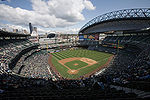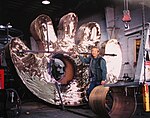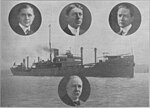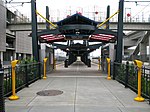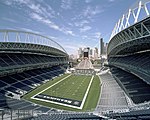Lumen Field is a multi-purpose stadium in Seattle, Washington, United States. Located in the city's SoDo neighborhood, it is the home field for the Seattle Seahawks of the National Football League (NFL), the Seattle Sounders FC of Major League Soccer (MLS), and OL Reign of the National Women's Soccer League (NWSL). Originally called Seahawks Stadium, it was renamed Qwest Field in June 2004 when telecommunications carrier Qwest acquired the naming rights. It became known as CenturyLink Field in June 2011 after Qwest's acquisition by CenturyLink, and then received its current name in November 2020 with CenturyLink's rebrand to Lumen Technologies. It is a modern facility with views of the Downtown Seattle skyline and a seating capacity of 68,740 spectators for NFL games and 37,722 for most MLS matches. The complex also includes the Event Center which is home to the Washington Music Theater (WAMU Theater), a parking garage, and a public plaza. The venue hosts concerts, trade shows, and consumer shows along with sporting events. Located within a mile (1.6 km) of Downtown Seattle, the stadium is accessible by multiple freeways and forms of mass transit.
The stadium was built between 2000 and 2002 on the site of the Kingdome after voters approved funding for the construction in a statewide election held in June 1997. This vote created the Washington State Public Stadium Authority to oversee public ownership of the venue. The owner of the Seahawks, Paul Allen, formed First & Goal Inc. to develop and operate the new facilities. Allen was closely involved in the design process and emphasized the importance of an open-air venue with an intimate atmosphere.
Seahawks fans at Lumen Field have twice claimed the Guinness World Record for loudest crowd roar at an outdoor stadium, first at 136.6 decibels in 2013, followed by a measurement of 137.6 decibels in 2014. The crowd's notorious noise has also contributed to the team's home field advantage with an increase in false start (movement by an offensive player prior to the play) and delay of game (failure of the offense to snap the ball prior to the play clock expiring) penalties against visiting teams. The stadium was the first in the NFL to install a FieldTurf artificial surface. Numerous college and high school football games have also been played at the stadium, including a two-year stint for the Washington Huskies during the renovation of Husky Stadium from 2011 to 2012. The XFL's Seattle Dragons also played at Lumen Field in 2020.
Lumen Field is also designed for soccer. The first sporting event held included a United Soccer Leagues (USL) Seattle Sounders match. The USL team began using the stadium regularly for home games in 2003. The MLS expansion team, Seattle Sounders FC, began its inaugural season in 2009 at the stadium. Lumen Field was the site of the MLS Cup in 2009 and 2019. The venue also hosted the 2010 and 2011 tournament finals for the U.S. Open Cup as well as the second leg of the 2022 tournament final for the CONCACAF Champions League; the Sounders won all three finals, with new tournament attendance records set for each final (or leg) hosted at Lumen Field. In August 2013, the Sounders broke a new home field attendance record when 67,385 fans turned out to watch them play the Portland Timbers. The stadium hosted several CONCACAF Gold Cup matches across multiple editions, and the Copa América Centenario in 2016. It is part of Seattle's bid to host matches during the 2026 FIFA World Cup, which was awarded to the United States, Canada, and Mexico.


